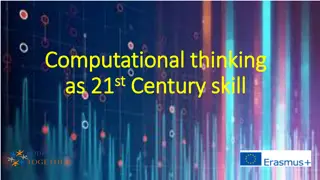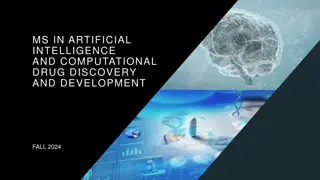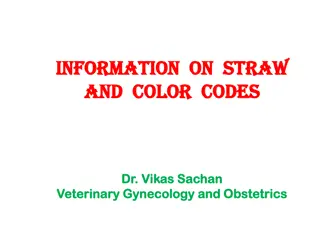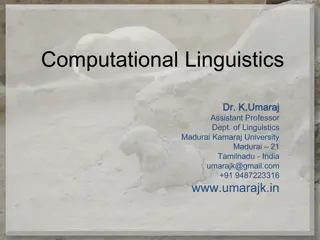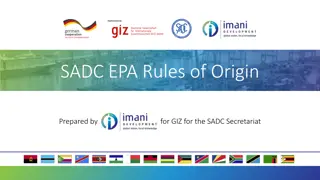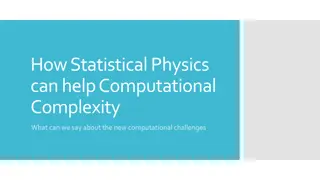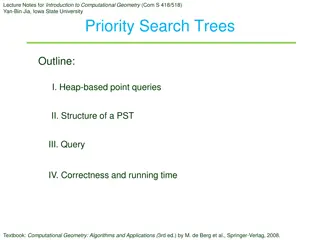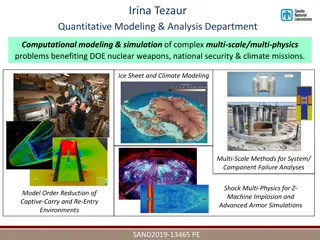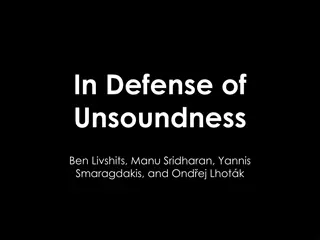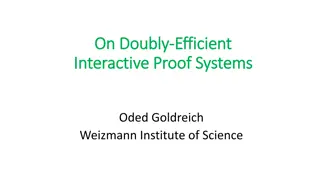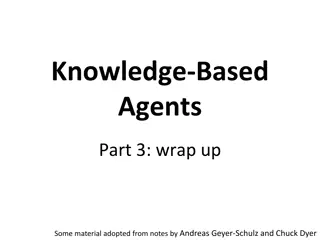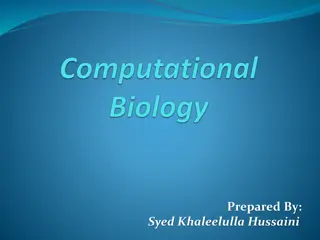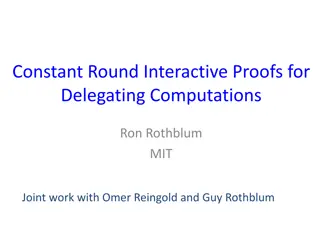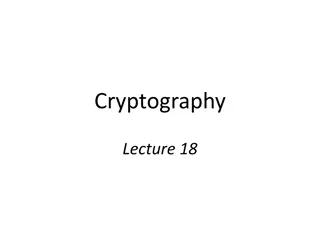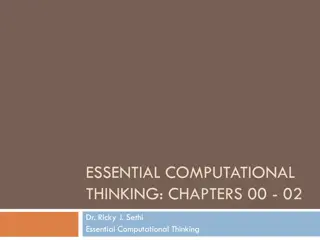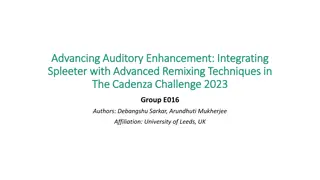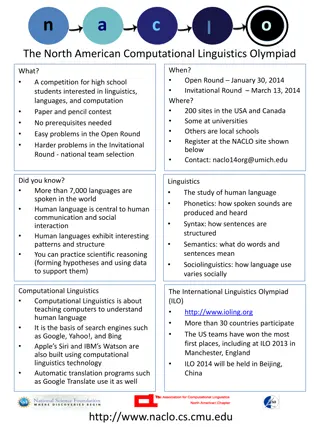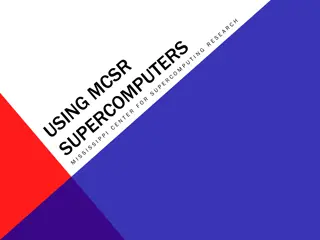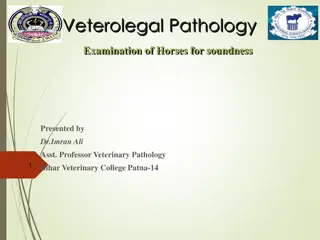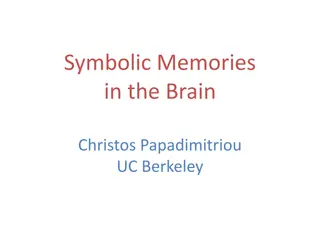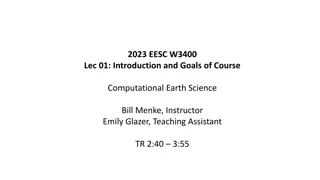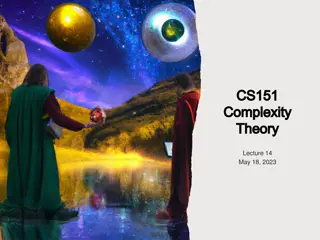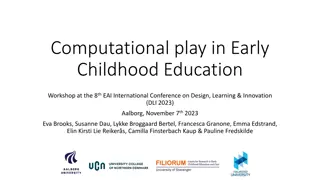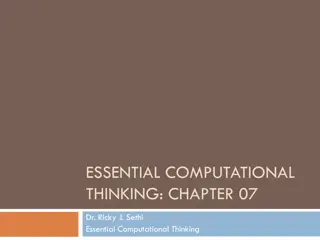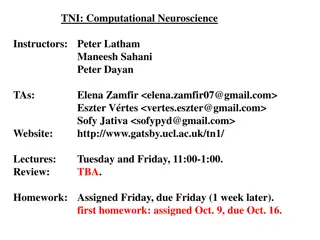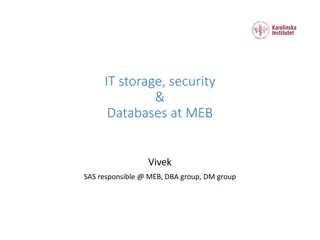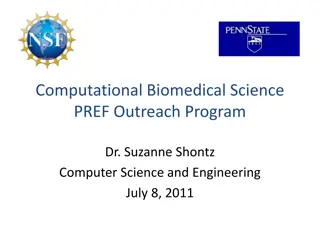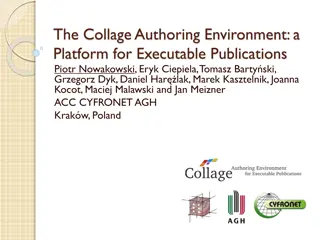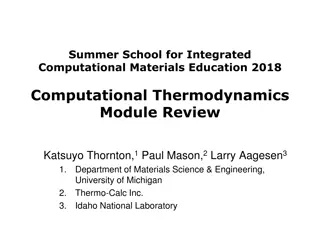Computational thinking as 21st Century skill
Computational thinking is a critical skill for the digital age, involving problem-solving techniques that enable computers to process information effectively. It precedes programming and requires breaking down complex problems into manageable steps. Educators emphasize computational thinking exercis
10 views • 4 slides
Master's Program in Computational Drug Discovery and Development - Fall 2024 Curriculum
This Master's program offers a comprehensive curriculum focusing on Artificial Intelligence, Computational Drug Discovery, and Development. With a blend of cutting-edge technologies and practical applications, students delve into techniques, AI/ML, big data mining, modeling, and more. Through intens
21 views • 7 slides
Breeding Soundness and Straw Identification in Cattle
Learn about the importance of evaluating breeding soundness in bulls, maintaining insemination records, and identifying straws for successful reproduction in cattle. Dr. Vikas Sachan provides valuable insights on bull identity, semen station codes, production dates, and color codes for different bre
2 views • 7 slides
Computational Linguistics and Natural Language Processing
Explore the fascinating fields of Computational Linguistics and Natural Language Processing (NLP), delving into their development, applications, and significance. Learn about the study of human languages in computational models, the importance of corpora in linguistic research, and the various types
6 views • 33 slides
Technical Soundness of EU-SADC EPA Rules of Origin
The implementation and technical soundness of Rules of Origin under the EU-SADC EPA are crucial for the utilization of trade preferences. Compliance with rules of origin is essential for receiving tariff preferences, but drafting these rules accurately is challenging. Recommendations include specify
12 views • 12 slides
Computational Complexity Through Statistical Physics
In the age of vast data growth, tackling complex computational problems is crucial. Statistical physics can provide insights into handling the new challenges arising from the exponential increase in data. As we delve into understanding the complexity of computational tasks, it becomes evident that e
4 views • 24 slides
Introduction to Priority Search Trees in Computational Geometry
This lecture outlines the structure and query process of Priority Search Trees (PST) in computational geometry. It covers heap-based point queries, range trees for windowing queries, handling query ranges in 1D and 2D spaces, and using heaps to efficiently handle query ranges. The content discusses
4 views • 18 slides
Advancing Computational Modeling for National Security and Climate Missions
Irina Tezaur leads the Quantitative Modeling & Analysis Department, focusing on computational modeling and simulation of complex multi-scale, multi-physics problems. Her work benefits DOE nuclear weapons, national security, and climate missions. By employing innovative techniques like model order re
4 views • 6 slides
Unsoundness in Static Analysis: Challenges and Utility
The discussion explores the prevalence of unsoundness in static analysis for realistic programming languages, highlighting common language features and their impact on soundness. It questions the necessity of achieving absolute soundness and presents scenarios where unsound analyses are tolerated in
6 views • 12 slides
Efficient Interactive Proof Systems Overview
This document discusses various aspects of efficient interactive proof systems, including doubly efficient IPs, simple doubly efficient IPs, and the Sum-Check Protocol. It explains concepts such as completeness, soundness, and strategies for verifiers and provers. The content covers examples like NP
5 views • 12 slides
Knowledge-Based Agents: Inference, Soundness, and Completeness
Inference, soundness, and completeness are crucial concepts in knowledge-based agents. First-order logic allows for expressive statements and has sound and complete inference procedures. Soundness ensures derived sentences are true, while completeness guarantees all entailed sentences are derived. A
4 views • 6 slides
Computational Biology: Proteins, DNA, RNA, Genetics, and Evolution
Computational Biology combines computational methods with molecular biology to solve biological problems. Explore topics like proteins, DNA, RNA, and genetics, learning about amino acids, nucleotides, and the genetic code. Understand the evolutionary processes of mutation and natural selection.
4 views • 21 slides
Constant Round Interactive Proofs for Delegating Computations
The research explores techniques for securely delegating computations to the cloud, addressing concerns of correctness and privacy through interactive proofs and efficient verification methods. It compares classical and doubly efficient interactive proofs, emphasizing the importance of computational
3 views • 43 slides
IHBG Competitive NOFO Training - Soundness of Approach Subfactor 3.1 Overview
This overview covers Rating Factor 3 - Soundness of Approach, focusing on Subfactor 3.1 of the Indian Housing Block Grant (IHBG) Competitive NOFO. Subfactor 3.1 outlines competitive priorities including New Housing Construction, Housing Rehabilitation, Acquisition of Units, and Affordable Housing-Re
4 views • 47 slides
Introduction to Computational Number Theory in Cryptography
Practical private-key cryptography can be done without advanced math, but understanding computational number theory is essential for public-key encryption. This field focuses on the computational difficulty of problems, analyzing algorithms' running times, classifying problems as easy or hard based
3 views • 27 slides
The Essence of Computer Science and Computational Thinking
Delve into the fundamentals of Computer Science and Computational Thinking through chapters discussing the nature of science, predictions in physics, and the distinction between Computer Science and Computer Information Systems. Explore the relationships between Math, Physics, and Computer Science i
4 views • 29 slides
Advancing Auditory Enhancement: Integrating Spleeter with Advanced Remixing Techniques in The Cadenza Challenge 2023
Our project for The Cadenza Challenge 2023 focused on improving audio for headphone users with hearing loss by integrating Spleeter's deep learning capabilities. We utilized N-ALR prescriptions, Butterworth bandpass filters, and Dynamic Range Compression to enhance audio quality. By leveraging advan
0 views • 19 slides
North American Computational Linguistics Olympiad: A Competition for High School Students
The North American Computational Linguistics Olympiad (NACLO) is a competition for high school students interested in linguistics, languages, and computation. It consists of an Open Round in January and an Invitational Round in March, with no prerequisites needed. Participants tackle easy problems i
15 views • 4 slides
Mississippi Center for Supercomputing Research (MCSR) Overview
The Mississippi Center for Supercomputing Research (MCSR) supports computational research in various fields like Chemistry, Bioinformatics, Physics, Engineering, and Computer Science for Mississippi IHLs. They provide training to optimize computational resources, offer classes for computational trai
6 views • 23 slides
Veterolegal Pathology: Examination of Horses for Soundness by Dr. Imran Ali, Asst. Professor at Bihar Veterinary College
In the field of veterolegal pathology, examining horses for soundness is crucial for assessing their natural usefulness. This examination involves identifying conditions such as bone spavin, bog spavin, bowed tendon, and curb, each with specific symptoms that indicate unsoundness as per legal defini
0 views • 18 slides
Computational Theories of Brain Function
In this series of images and text snippets, the discussion revolves around the emerging field of computational theories of brain function. Various aspects such as symbolic memories, the relationship between the brain and computation, the emergence of the mind from the brain, and computational thinki
4 views • 53 slides
Computational Earth Science Course Overview
Explore the world of Computational Earth Science with Bill Menke as the instructor and Emily Glazer as the teaching assistant. The course aims to help you become proficient in applying Python-based computational methods to understand dynamic Earth Science phenomena. Through modeling, you will gain i
4 views • 34 slides
Interactive Proofs in Complexity Theory
Delve into the realm of interactive proofs in complexity theory, exploring concepts such as completeness, soundness, and efficiency. Discover how interactive proof systems can be utilized in scenarios like graph isomorphism and their implications on the complexity classes NP and coNP. Uncover the in
1 views • 40 slides
Computational Play in Early Childhood Education: DLI 2023 Workshop
The workshop at the 8th EAI International Conference on Design, Learning & Innovation (DLI 2023) in Aalborg aims to delve into the application of computational play with mathematics in early childhood education. Through live sessions and discussions, opportunities and challenges in utilizing computa
19 views • 7 slides
ESSENTIAL COMPUTATIONAL
In Chapter 7 of "Essential Computational Thinking" by Dr. Ricky J. Sethi, dive into procedural programming concepts like sequence, selection, and iteration to craft computational solutions. Explore how engineers approach problem-solving in software development, emphasizing efficiency and abstraction
3 views • 27 slides
Neuroscience at UCL: Computational Brain Insights
Delve into the world of computational neuroscience with instructors Peter Latham, Maneesh Sahani, and Peter Dayan at University College London. Explore the brain's intricacies, from basic facts to mathematical foundations, and uncover the hidden complexities of neural processes. Engage in lectures,
3 views • 98 slides
IT storage, security & Databases at MEB
Responsible for managing data storage, security, and databases at MEB Vivek SAS. The role involves overseeing various server setups, computational servers, home and scratch disk management, and providing access to applications and SQL servers. Additionally, managing computational servers at MEB requ
0 views • 13 slides
Computational Biomedical Science Outreach Program - Overview
Delve into the intersection of computational science and biomedical engineering through the Computational Biomedical Science Outreach Program led by Dr. Suzanne Shontz. Explore the application of computational tools in treating conditions like deep vein thrombosis and hydrocephalus. Learn about the
3 views • 29 slides
Platform for Executable Publications in Modern Computational Science
Computational science faces challenges in publishing large data volumes and complex algorithms. The Collage Authoring Environment offers a solution for validating and sharing executable content within research papers, addressing issues of trust and verifiability in scientific publications. This plat
3 views • 19 slides
Computational Models for Tuberculosis Diagnosis: A Review
This systematic review examines computational models for diagnosing tuberculosis, highlighting strengths, weaknesses, and areas for improvement. The research aims to enhance TB diagnostic accuracy through advanced computational systems.
2 views • 19 slides
Computational geometry introduction
Dive into the fundamentals of computational geometry with this introduction by Rugaia Omer Ahmed. Explore key concepts, algorithms, and applications in the field. Gain insights into geometric computations and problem-solving techniques. Enhance your understanding of spatial data structures and geome
3 views • 15 slides
Mastering Computational Geometry: Problem-Solving Strategies
Explore the world of computational geometry through practical problems like finding the closest pair of points in a 2D plane. Delve into the divide and conquer approach to efficiently solve complex geometric challenges. Uncover insights on organizing points, sorting by x-values, and handling proximi
10 views • 25 slides
Computational Thermodynamics Module Review - Summer School 2018
Explore the Computational Thermodynamics Module at the Summer School for Integrated Computational Materials Education in 2018. Dive deep into thermodynamic concepts, phase equilibrium, and the application of computational tools in real-world engineering problems. Gain insights into Gibbs Free Energy
3 views • 14 slides
Fiat-Shamir and Quantum Forking Conjecture
Explore the concept of Fiat-Shamir and Quantum Forking Conjecture in non-interactive proof systems, sigma protocols, and breaking soundness in a quantum context. Learn about special and strict soundness, zero-knowledge proofs, and the transformation of sigma protocols into non-interactive systems.
3 views • 16 slides
Knowledge-Based Agents and Logical Inference
Explore the essential concepts of knowledge-based agents, logical inference, soundness, completeness, and the importance of reasoning soundness in agent-based decision-making. Learn how intelligent agents use knowledge bases and inference mechanisms to make informed choices.
0 views • 6 slides
Edgewood City School District - Repurposing EECC for Cost Savings and Academic Soundness
Explore the board-requested information on potentially repurposing or closing EECC as a cost-saving measure within Edgewood City School District. Discover the considerations for academic soundness, fiscal responsibility, and community support. Review enrollment trends, planning values, and possible
4 views • 22 slides
Fiat-Shamir Non-Interactive Proof System Basics
Fiat-Shamir protocol overview, Sigma protocols, breaking soundness in a quantum context, fixing strict soundness, and recap of Sigma protocols in a quantum setting. Explore the transformation of sigma protocol into a non-interactive proof system, classical security features, and zero-knowledge prope
1 views • 16 slides
Enhancing Computational Thinking Across Diverse Disciplines
Explore the integration of computational thinking across various academic fields to frame questions, solve problems, and gain new insights. Learn what computational thinking entails, its importance, and how it differs from computer literacy. Discover the benefits of making computational thinking exp
1 views • 15 slides
Building Non-Interactive Zero-Knowledge Proofs without Interaction
Learn about Non-Interactive Zero-Knowledge (NIZK) proofs based on Computational Diffie-Hellman assumptions, exploring completeness, soundness, and zero-knowledge properties. Discover the main question of how to construct NIZKs and the prior work behind it, including public-key assumptions and crypto
3 views • 29 slides
Knowledge-Based Agents: Inference, Soundness, and Completeness
Explore the concepts of inference, soundness, and completeness in knowledge-based agents, emphasizing the importance of reasoning soundness without independent access to the world. Learn how agents use knowledge bases and inference mechanisms to make informed decisions based on logical sentences rep
0 views • 6 slides
